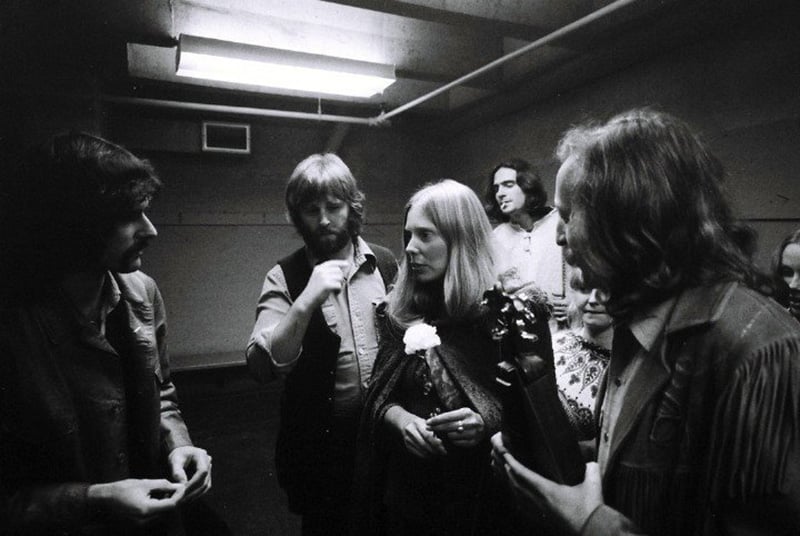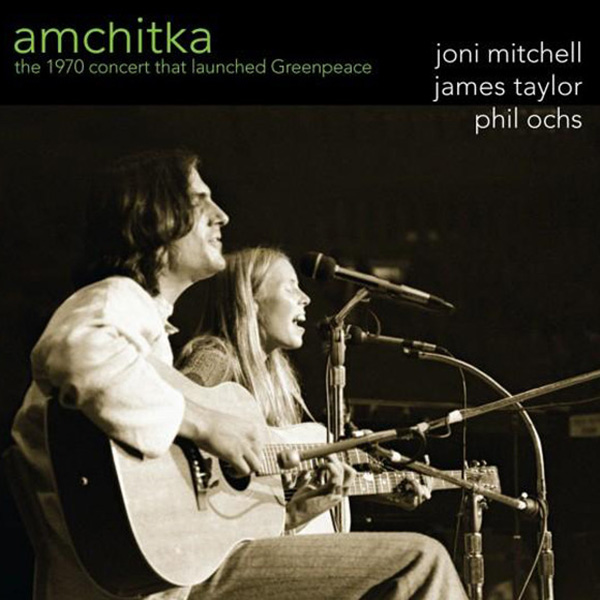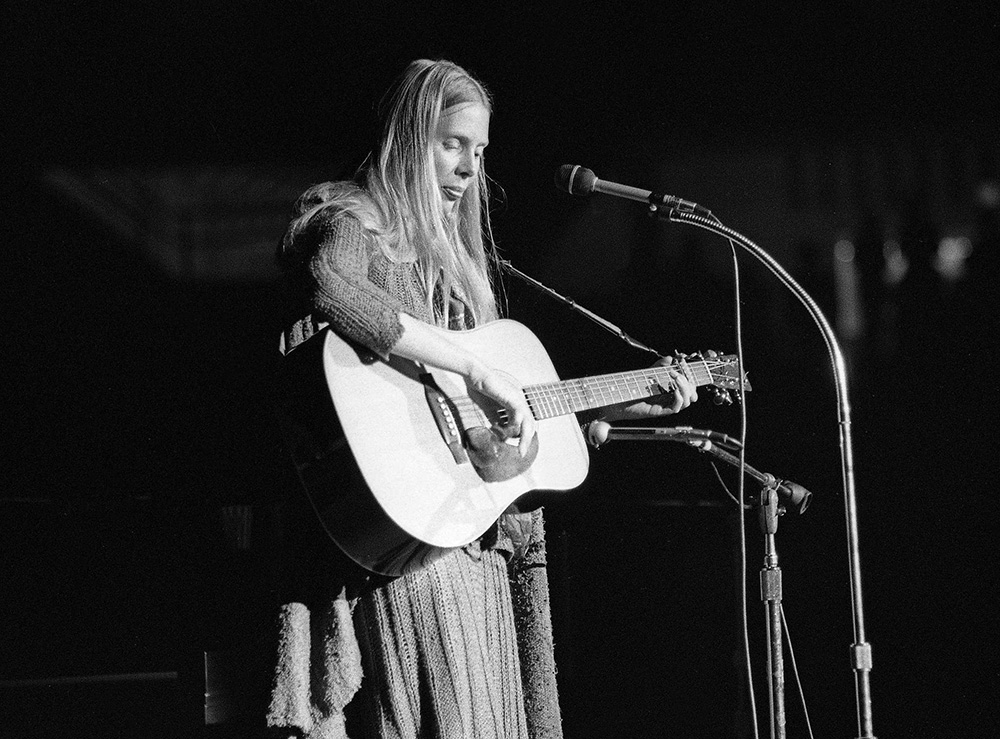Irving Stowe needed to raise money and he needed it fast. The 55-year-old Yale-educated lawyer had abandoned his white-collar profession to become a full-time activist. He was part of a small group called the Don’t Make a Wave Committee, an irreverent, ironic name as they made a pun about protest while also capturing the fear that a planned underground nuclear test in the ocean might create a tidal wave.
The fledgling group was selling 25-cent buttons and $3 T-shirts on Vancouver street corners to raise funds to buy a boat to sail to the nuclear test zone at Amchitka, a forlorn volcanic outcropping in the uninhabited Rat Islands group of Alaska’s Aleutian Islands. Sales were good, but the funds raised were a pittance.
Stowe’s brainstorm was to hold a benefit rock concert.
He invited Joan Baez. She was already booked. Instead, she sent a cheque for $1,000 along with something more valuable — Joni Mitchell’s telephone number. Mitchell agreed to waive her regular appearance fee,* as did the folksinger Phil Ochs and local favourites Chilliwack, a renamed outfit who had built a local following as the Collectors, a psychedelic band.
At the last minute, Mitchell told Stowe she wanted to bring along her new boyfriend from Los Angeles to perform with her on stage.
Stowe, a jazz and classical fan, worried an unknown singer might ruin the concert. In the confusion over whom she was bringing, it was briefly thought Mitchell’s boyfriend’s name was James Brown. In time, it was determined her paramour was not the Godfather of Soul, but an up-and-coming performer whose second album, Sweet Baby James, had been released a few months earlier. James Taylor went unbilled in promotions for the concert.
Posters in green and white were plastered on Vancouver campuses and around the hippie enclave of Kitsilano to promote the show. Fans came by the thousands. Tickets were just $3 (about $20 today).
That’s how 50 years ago this weekend, a handful of middle-aged folks motivated by Quaker principles put on a concert to launch Greenpeace.
Benefit concerts have since become common, but this unlikely group launched their effort a year before George Harrison’s famous Concert for Bangladesh and more than a decade before Live Aid, Band Aid, Farm Aid and all the other similar large shows.
Folding chairs were placed in front of the stage on the cement floor of the Pacific Coliseum. The air smelled of patchouli and sandalwood. The interior of the arena was cloudy with smoke, some of it even tobacco. The packed hockey arena had a lively atmosphere.
“The audience was being very vocal,” emcee Terry David Mulligan recalled recently. “Lots of call and response. No heckling. Just yelling out song requests.”
Mulligan knew Mitchell back in her Saskatoon days at the Louis Riel Coffee House in the mid-1960s, so the pair caught up backstage in a hockey dressing room before the show.
“I remember,” Mulligan said, “hearing for the first time the word Greenpeace. That was cool.”

The tickets promised the show was to start at 8 p.m. They did not state that it was 8 p.m. hippie time.
When the show finally got under way, Stowe addressed the crowd.
“Green peace is beautiful,” he said, the Boston-meets-Brooklyn dialect of his native Rhode Island evident in some words, “and you ahr beautiful because you ahr here tonight. You came here because you ahr not on a death trip. You believe in life, you believe in peace, and you want them now.” The statement earned scattered applause. “By coming here tonight you ahr making possible a trip fah life and fah peace. You ahr supporting the first Greenpeace project. Sending a ship to Amchitka to try to stop the testing of hydrogen bombs theyah. Or anywheyah.”
He urged everyone to hang on to their ticket stubs for a special prize to be awarded at the end of the show.
Mulligan introduced the first act.*
“Here is somebody who has been here before,” Mulligan said. “Will you welcome him, please, A&M recording artist Phil Ochs."
Ochs, mostly forgotten by subsequent generations, was a Texas-born folk singer out of New York who got little commercial radio play for his songs, with their trenchant lyrics denouncing the Vietnam War, Jim Crow laws and the timidity of liberals.
Wearing a black leather jacket, Ochs ripped through “The Bells” before offering a half-heard aside that was likely missed by many in the audience.
“It’s not every day you get to play in a police state,” Ochs muttered.
A crisis in Quebec
People awoke the morning of the concert to learn the federal government had invoked the War Measures Act at 1 a.m. by declaring an “apprehended insurrection” in Quebec. Earlier in the month, two cells of the Front de libération du Québec, which was responsible for a decade-long spree of deadly bombings and bank robberies, had kidnapped James Cross, the British trade commissioner, and Pierre Laporte, Quebec’s labour minister.
Asked three days earlier by a reporter about how far he would go to sustain order, then-prime minister Pierre Trudeau, father of today’s prime minister, replied, “Just watch me.”
In Montreal, police conducted raids without warrants and arrested hundreds of people without cause, ostensibly in the hunt for the kidnappers. The Montreal police were so ignorant, one arrestee later complained, they seized art books about cubism, thinking they were about Cuba.
Soon after Laporte was strangled to death by his captors, his body was dumped in the trunk of a car abandoned at a military air base outside Montreal. The bare apartment where Cross was held was eventually discovered. His captors were escorted to an airplane that flew them to exile in Cuba and Cross was freed.
The dramatic events taking place 3,700 kilometres to the east seemed to have little relevance to the people of British Columbia or the 10,000 people at the concert. They would soon learn local politicians intended to use their newfound powers.
Of the performers, Ochs seemed the only one to appreciate the gravity of the news.
After performing “Changes,” Ochs offered a subdued, “A song for the suspension of civil liberties.” It was delivered more as a muttered aside to himself than a ringing call to arms.
Then he played “I’m Going to Say It Now.” The opening lyrics: “Oh, I am just a student, sir, and only want to learn/But it’s hard to read through the risin’ smoke of the books that you like to burn... ”
He introduced numbers with perfunctory description. “A song about the military,” he murmured. The familiar opening chords of “I Ain’t Marching Anymore” gained applause for what turned out to be a blistering rendition of the anti-war anthem.
“A song about the dangers of show business,” he said before playing “Chords of Fame.”
Some in the crowd called out for “Joe Hill.”
In retrospect, the concert can be seen as a last salute to the rabble-rousing political folkies of the 1960s, like Ochs, as exhaustion from protesting a seemingly unstoppable war led to political folkies being eclipsed by ascendent singer-songwriters of the ’70s, like Mitchell and Taylor.
While Ochs came across as an Old Testament prophet warning of impending doom, Taylor generated a mellow, romantic vibe by opening with “Something in the Way She Moves” from his debut album and “Fire and Rain,” which peaked at No. 2 in Canada and at No. 3 on the Billboard 100 in the United States that very month.
Mitchell was a relaxed figure at the piano and on guitar and dulcimer, an instrument she had learned while on a recent summer holiday in Greece. She was having fun among friends, introducing unreleased songs and playing the likes of “Bony Maronie,” “one of my favourite songs from those YMCA dances I used to go to back in Saskatoon,” she said.
She delivered a vibrant version of “Carey,” which she would commit to vinyl on the album Blue to be released in 1971. She adroitly segued into “Mr. Tambourine Man,” calling on the audience to sing along on the chorus. At one point, she blanked on the lyrics and asked her lover to take over.
“What’s the next verse, James?” she asked as she continued strumming. “Do you want to come sing it? There’s a microphone over here.”

The concert ended after midnight with Taylor joining Mitchell for a duet of “The Circle Game.”
Stowe’s 14-year-old daughter Barbara, a Grade 10 student at Kitsilano High, sat in the front row, where she thought the blue streaks she had tie-dyed onto her father’s formerly white Brooks Brothers' cotton shirt made him look like he was wearing the sky.
Born in Providence, Rhode Island, as Irving Strasmich, the young lawyer eloped with a psychiatric social worker named Dorothy Rabinowitz to spend their wedding night at a banquet hosted by a civil-rights group for which Irving was working pro bono. The young couple opposed war and nuclear weapons.
They decided to become Quakers. They changed the family name to honour the abolitionist Harriet Beecher Stowe. After a son and daughter were born in the mid-1950s, they decided to leave their homeland to find refuge from nuclear weapons. They landed in Auckland, New Zealand, where they stayed until nuclear weapons testing was announced for French Polynesia in 1966.*
The family landed in Vancouver, where they met Jim and Marie Bohlen at a peace march. The two couples were joined by Paul Côté in forming the Don’t Make a Wave Committee. The family home at 2775 Courtenay St., a nondescript Vancouver Special in leafy West Point Grey, became a gathering place for peaceniks and environmental activists.
At the end of one meeting, Stowe flashed a young ecologist named Bill Darnell a "V" sign with his fingers to signify peace. Darnell replied, “Let’s make it a green peace.” The Bohlens’ son designed a button for the group with an ecology symbol and a peace symbol vertically flanking the single word "Greenpeace."
In the hours before the concert, the musicians enjoyed the hospitality of the Stowe family. Ochs dined on Barbara’s vegetarian lasagna. Joni and James made out in the backseat of the family car on the way to the show.
When it came time to announce the door prize, Stowe pulled out a stub and read a five-digit number. The lucky winner would be allowed to join the crew of a boat sailing into a nuclear test zone in the dangerous waters of the North Pacific Ocean. Not surprisingly, it went unclaimed.
When they got around to counting up the proceeds, the Don’t Make a Wave Committee had expenses ranging from $18 for piano tuning to a whopping $3,500 (15 per cent of gross ticket sales) to the Pacific National Exhibition for use of the Coliseum, which they had been led to believe would be waived. (They also naively believed the Vancouver Sun would excuse $420 worth of advertising.) After expenses, the net receipts from ticket sales, combined with $683.07 raised at the concert by passing the hat, left the committee with $17,164. They would have to do more fundraising.
The following year they chartered, for $12,000, a ramshackle halibut seiner named Phyllis Cormack to sail to the testing site. The original idea had been Marie Bohlen’s, combining an aquatic sit-in with the Quaker tradition of bearing witness. In the end, Irving Stowe stayed home while Côté, an accomplished sailor, missed the voyage to train for the Olympics, at which he would win a bronze medal in the Soling class of fin-keeled sloops, claiming Canada’s first sailing medal in 40 years. Others crewing the boat included the journalists Ben Metcalfe and Bob Hunter, a Vancouver Sun columnist.
The fishing boat, nicknamed Greenpeace for the voyage, never reached its destination, the voyage halted by weather and the U.S. Coast Guard. The test was delayed. A third underground nuclear test on Amchitka was finally conducted in November 1971. The explosion was likely responsible for a series of minor earthquakes in subsequent days, but the tsunami the Don’t Make a Wave people feared never happened. The test was the last of its kind on the island, which has since become a bird sanctuary as part of the Alaska Maritime National Wildlife Refuge.
‘Draft dodgers better start dodging’
In the days following the concert, then-Vancouver mayor Tom Campbell decided the imposition of the War Measures Act — even if it was aimed at activities half a continent away — was an opportunity too good to miss. He wanted police to use the new temporary powers to continue his vendetta against hippies and others.
“If we have additional powers, we intend to use them,” he said the morning after the Greenpeace concert. “Yes, I would use them for pursuing dope pushers and other kinds of criminals. Of course, I would. I would suggest the draft dodgers better start dodging. ‘Get out of here, boy, because we’re going to pick you up.’
“I believe the law should be used against any revolutionary, whether he’s a draft dodger or a hippie, if he’s in an organization that advocates the overthrow of the government by force.”
It wasn’t an empty threat. Editors at student newspapers found themselves having to make tough decisions about risking arrest under the act.
At Simon Fraser University, publication of the Peak was delayed a day after its printer balked at printing a newspaper including the FLQ manifesto. The Peak removed all student names from the issue except editor-in-chief Cameron Beck in case police decided to charge the newspaper with subversion.
“To deny freedom to fight through speech and the press is to make inevitable other forms of battle,” Beck wrote in an editorial.
Robert Higinbotham, editor of the Martlet at the University of Victoria, endured two visits from the RCMP and another from a Saanich constable to see if he was publishing subversive materials forbidden under the War Measures Act. He was ordered not to publish a letter praising the FLQ and “all socialist liberation movements across the world” written by assistant philosophy professor Ronald Kirkby. The editor did reprint an FLQ manifesto.
At the University of British Columbia, editor Nate Smith published the Kirkby letter in the Ubyssey praising the FLQ “in the interests of free speech.”
Both Smith and Higinbotham went on to distinguished careers as judges.
In Victoria, the provincial government issued a cabinet order demanding the firing of any professor or teacher advocating the overthrow of the government. The move generated banner headlines in the daily newspapers: “Fire pro-FLQ teachers, B.C. orders” (Vancouver Sun); “Schools told ‘fire radicals’” (Victoria Daily Times).
In Dawson Creek, one high school teacher got caught in the hysteria and lost his job.
The principal had written a telegram supporting Trudeau and the imposition of the War Measures Act and asked students to sign it.
Arthur Olsen, a 30-year-old teacher at the school, took it upon himself to tell students about the history of Quebec and the internment of law-abiding Japanese-Canadians under the War Measures Act during the Second World War.
“I was hauled into the principal’s office the next morning,” he once told me. “He said he had had phone calls from irate parents. The school board later asked me to resign, but I made them fire me. Otherwise, nobody would have known.”
Olsen never taught again. He moved to Powell River and became a logging equipment operator.
*Changes were made on Oct. 17 at 12:40 p.m. to reflect the recollections of Irving Stowe’s daughter Barbara Stowe. We thank her for her corrections. ![]()
Read more: Music
















Tyee Commenting Guidelines
Comments that violate guidelines risk being deleted, and violations may result in a temporary or permanent user ban. Maintain the spirit of good conversation to stay in the discussion.
*Please note The Tyee is not a forum for spreading misinformation about COVID-19, denying its existence or minimizing its risk to public health.
Do:
Do not: